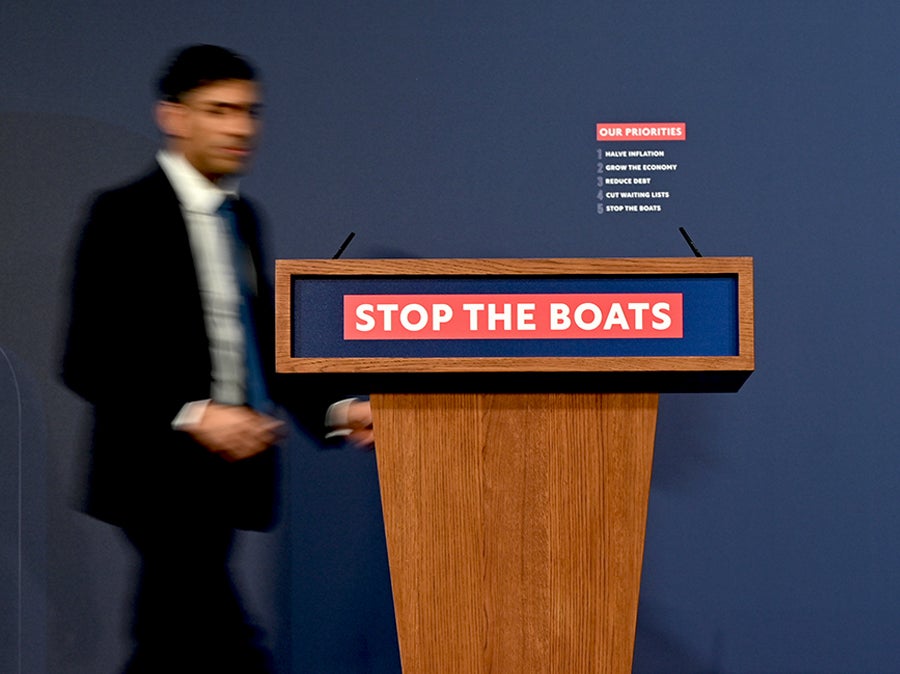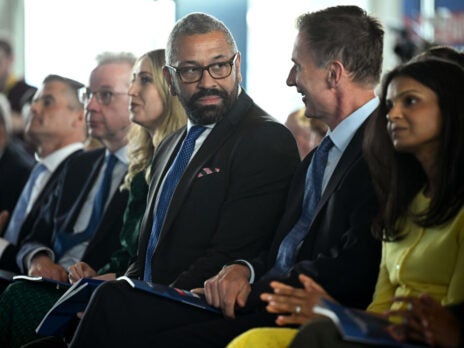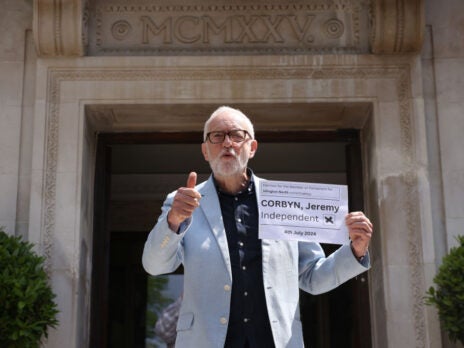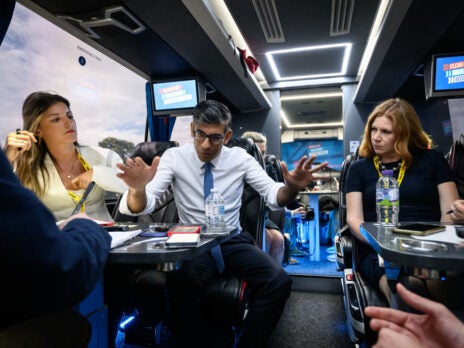
Maybe I’m stuck in the Westminster bubble (if it stretches to Chester). But right now I’m struggling to appreciate why the Prime Minister thinks taking to a podium with STOP THE BOATS emblazoned on it is a sound political strategy for 2023.
In one sense, it reminds me of Jeremy Corbyn. Cast your minds back to 2019. The country was desperate for an end to the Brexit wars and, after Theresa May’s tortured efforts, Boris Johnson was promising a resolution. Amid this tumult, Corbyn offered voters… free broadband.
The litany of policies Labour announced at that election – higher taxes on the wealthy and corporations, renationalisation of public utilities, the abolition of tuition fees – polled well individually. But voters didn’t like the overall programme and they didn’t like Corbyn. Perceptions of competence trumped all. Can you deliver your policies without breaking the bank or the country? And despite Labour’s attractive baubles, none of its headline policies were Brexit-related. Its Europe policy – a referendum on whether to accept a renegotiated withdrawal deal or remain in the EU – was fumbled. And like it or not, the median voter’s primary political anxiety in 2019 started and ended with an answer to Brexit.
[See also: Rishi Sunak can’t win his fight on the small boats bill]
Labour’s unwillingness to talk clearly about Brexit sent its supporters elsewhere. It was one of the many reasons for its landslide defeat. Fundamentally, the party failed to talk about the most urgent issue of the hour. It is through this lens that I view Sunak’s “stop the boats” strategy.
Here’s the thing. The median voter does want controls on immigration. The median voter would prefer immigration controls to be tighter rather than looser. They would rather we were tougher on refugees than more open to them. Britain may be in a more liberal position than previously – from 2014-16 Ukip was regarded by voters as having the best policies on immigration – but the underlying sentiment endures: voters want control.
The salience of immigration is also lower than it was previously: it no longer moves as many votes. In the past, immigration was regarded as an important issue by nearly half the country – a larger number than for the NHS and the economy.
[See also: Rishi Sunak’s anti-asylum plan may not be as politically beneficial as he hopes]
As of February this year, immigration was an important issue to just 12 per cent of voters. It sits a distant fifth in the overall ranking, three points above Brexit, but 13 points behind the NHS, 23 points behind inflation, and 28 points behind the economy. This isn’t 2010, or 2014 or 2016. So why is the Prime Minister acting as he is?
It should be obvious. But for those at the back, it’s because the Conservatives think this is a trump card for them and that it will help them recover support. Conservative politicians are more at ease banging the drum for immigration controls than Labour. Lower income and retired voters prioritise immigration more than the median Briton – though not by a significant degree (14 per cent compared with 12 per cent). Red Wall MPs, be they Blackpool’s Scott Benton, Cumbria’s Mark Jenkinson or Stoke’s Jonny Gullis, believe their voters can be animated by immigration once more. The Tories’ strategic assumption is that if they can rally their base, the next election may prove less disastrous than forecast.
It’s a fair strategy. But the riposte is an economic one. Matt Goodwin, whose work with Rob Ford on the rise of Ukip was formative to my own understanding of British public opinion, has written that voters, fundamentally, crave security. I agree with that. But he writes this: “Economic security from a cost-of-living crisis. Physical security from a collapsing National Health Service. And national security from the escalating small boats crisis and a mounting sense of social chaos across the country.”
My issue with this – which is why I compare Sunak in 2023 with Corbyn in 2019 – is that while all the above do resonate, the issues should not be regarded as having equal weight. At present, as Ipsos UK’s long-running issues index shows, economic security trumps all. It is the microeconomics of prices and wages and jobs and simple financial stability that matters most today. National security, if indeed Britons do actually link it to small boats, is only in fifth place.
While Sunak’s push may draw on existing anxieties and resentments about boats and borders, it likely won’t move many voters. The Prime Minister is asking voters to prioritise something other than their wage packets and weekly shops when both are being squeezed. It worked in 2016 when consumer confidence was in a much better state than it is now. But today the UK is facing the worst living standards crisis since records began, and a Conservative leader 20 points behind in the polls is left shouting, “But look! Boats!”
Read more:
This immigration bill isn't just illegal – it's dangerous
PMQs today: Keir Starmer talks tough on migrants
Leader: Why we need honesty on migration


